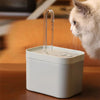How To Clean Your Cat's Ears: A Comprehensive Guide

How To Clean Your Cat's Ears: A Comprehensive Guide
Keeping your feline friend healthy and happy involves more than just feeding them delicious food and providing endless cuddles. Regular ear cleaning is a crucial part of preventative cat care, helping to avoid infections and discomfort. This comprehensive guide will walk you through the process of safely and effectively cleaning your cat's ears.
Why Clean Your Cat's Ears?
Cats' ears are prone to accumulating dirt, wax, debris, and sometimes even mites or infections. Leaving these build-ups untreated can lead to:
- Ear infections: These can be painful and require veterinary intervention.
- Wax buildup: Excessive wax can impair hearing and cause discomfort.
- Parasites: Ear mites are common and can cause intense itching and inflammation.
- Head shaking and scratching: These behaviors are often signs of ear problems.
Regular cleaning helps prevent these issues, keeping your cat comfortable and healthy.
What You'll Need
Before you begin, gather the necessary supplies:
- Cat ear cleaning solution: Choose a solution specifically formulated for cats. Avoid using human ear drops as they can be harmful.
- Cotton balls or gauze pads: Avoid using cotton swabs, as these can damage the eardrum.
- Soft towel: For wiping away excess solution.
- Treats: Positive reinforcement is key!
Step-by-Step Guide to Cleaning Your Cat's Ears
Follow these steps to clean your cat's ears safely and effectively:
- Check your cat's ears: Before you begin, visually inspect your cat's ears for any redness, swelling, discharge, or unusual odor. If you notice anything concerning, contact your veterinarian immediately.
- Warm the solution: Gently warm the ear cleaning solution to body temperature. Cold solution can startle your cat.
- Apply the solution: With your cat calm and relaxed (perhaps on your lap), gently apply a few drops of the solution into the ear canal. Don't fill the canal, just add enough to loosen debris.
- Massage the base of the ear: Gently massage the base of the ear for 15-30 seconds. This helps to distribute the solution and loosen any build-up.
- Let your cat shake their head: Your cat will likely shake their head to remove excess solution and debris. Let them do this naturally.
- Wipe away excess: Using a cotton ball or gauze pad, gently wipe away any visible dirt or debris from the outer ear. Avoid inserting anything into the ear canal.
- Reward your cat: Offer your cat a tasty treat to reward their good behavior.
Frequency of Ear Cleaning
How often you need to clean your cat's ears depends on their individual needs. Some cats may only require cleaning every few months, while others might need it more frequently. Consult your veterinarian to determine the best cleaning schedule for your cat.
When to See a Vet
While regular ear cleaning is important, it's crucial to know when to seek professional help. Contact your veterinarian if you notice any of the following:
- Persistent head shaking or scratching
- Redness, swelling, or discharge from the ears
- Unusual odor coming from the ears
- Visible signs of ear mites or infection
- Your cat seems to be in pain
Regular ear cleaning is a simple yet effective way to keep your cat healthy and happy. By following these steps and paying close attention to your cat's ears, you can help prevent serious health problems and maintain a strong bond with your furry companion.
Frequently Asked Questions (FAQs)
Can I use human ear drops on my cat?
No, never use human ear drops on your cat. Human ear drops contain ingredients that can be toxic to cats. Always use a cat-specific ear cleaning solution.
https://everypetpalace.com/collections/cat-healthcare/Eye-and-Ear
How often should I clean my cat's ears?
The frequency of ear cleaning depends on your cat. Some cats need their ears cleaned monthly, while others may only need it every few months. Your veterinarian can advise you on the best schedule for your cat.
https://everypetpalace.com/collections/cat-healthcare
My cat hates having their ears cleaned. What can I do?
Make the experience as positive as possible by using treats and praise. Start by gently touching your cat's ears regularly so they get used to the sensation. If your cat is very resistant, consult your veterinarian for advice.
What if I accidentally injure my cat's ear during cleaning?
If you accidentally injure your cat's ear, contact your veterinarian immediately. They can provide appropriate treatment and prevent infection.
https://everypetpalace.com/
-
Posted in
cat grooming, cats, pet cats




